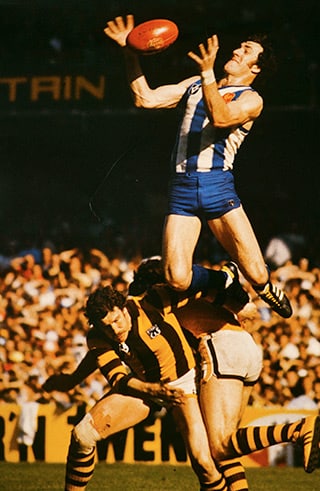The whiteboard contained a list of Ron Barassi’s physical, mental and tactical demands; words to influence his men to win the 1977 grand final replay between Collingwood and North Melbourne.
The final sentence, straight down the guts when we can, long bombs to Snake, highlighted the faith Barassi had in his full-forward.
Phil Snake Baker didn’t let Barassi down in grand finals.
Recruited from Albury, Baker was 19 on debut in 1971. Lean, yet muscular, with black shoulder-length hair and an unpredictable nature, he wore 29 on his back.
At 192 centimetres tall and 93 kilograms, he was considered a utility, playing in the ruck or defence at various times throughout his career. But it was at full-forward that he excelled.
In his eighth game, Baker kicked seven goals against Essendon, his best performance in terms of goals.
In the 1974 grand final against Richmond, Baker lined up at centre-half-forward and played well in a losing side. The following season he was gone, traded to Geelong where he played nine games and kicked nine goals.
He didn’t play at all in 1976. Legend has it he kept returning to Arden Street because he missed North badly and wanted to come back.
Barassi brought Baker back in 1977 to play at full-forward. It was his best season, 21 games and 35 goals.
But it wasn’t a season without uncertainty. He missed the qualifying final against Hawthorn but came back for the semi-final against Richmond.
In the preliminary final against Hawthorn, Baker took 11 marks and kicked two-goals-six.
Selected at full-forward for the grand final against Collingwood, Baker kicked three goals in the first quarter, helping North to a 17-point lead.
Late in the term, he went into the ruck and took a mark at half-back, firing out a handpass that missed its intended target. It was his first mistake for the game.
When the siren went, Barassi stormed out to the huddle and berated his full-forward for the errant handpass. It seemed an unnecessary blast, given how well Baker was playing.
But that’s how Barassi operated, where players were as only as good as their last possession.
At three quarter time, North trailed the Magpies by 27-points. Barassi swung the moves, but Baker turned the game.
Midway through the final quarter, he ran in a gentle arc, arms aloft, fists clenched and yelling in delight. His third goal for the quarter put North seven points in front.
The grand final famously ended in a draw. Baker kicked six of North’s nine goals.
In the replay, he kicked three goals but missed four gettable shots. As he accepted his premiership medallion, he cemented his legacy.
In 1978, Baker was affected by injury and form, playing 14 games and kicking 25 goals. He wasn’t selected for the qualifying final against Hawthorn or the preliminary final against Collingwood.
But he came back for the grand final against the Hawks and proved what a big game player he was.
At quarter time in the 1978 grand final, North trailed Hawthorn by 19 points. 12 minutes into the second term, the Hawks extended their lead to 25 points.
Baker brought North back into the game. He took six marks and kicked four-goals-two in the second quarter. It was perhaps the best quarter of his career.
One of his marks is arguably the best mark ever taken in grand finals. It became mark of the year.
It was the quintessential long bomb to Snake, as Barassi implored his men to do.
Baker was lurking five metres behind Kelvin Moore and Ian Paton when Maurice Boyse gathered the ball on the wing and booted it long.
Boyse’s kick went sixty metres, a long bomb. Baker sprinted and launched himself, slamming into Moore and Paton, his knees on their shoulders.
Baker hung in the air, juggling the football once then fell back to earth, landing on his right side and rolling onto his back, holding the ball aloft. The crowd was screaming.
Then came the climax, the goal that put North in front.
To quell Baker’s influence, he received extra attention from the Hawks. In the final quarter, he took another screamer surrounded by four Hawthorn defenders. He finished with six goals, but Hawthorn won the premiership.
Had North won, Baker’s game would be better remembered. Regardless, it remains one of the best performances by a full-forward in a losing grand final.
Baker never kicked another goal for North. He played four games in 1979 before injury forced his retirement at 27, an age when he would’ve been at his peak.
North finished second in 1979. Baker might’ve made a difference in the finals if he was fit.
He played 106 games and kicked 125 goals. He wasn’t a star, but when Baker was on, he played like a star.
He kicked 15 goals for North Melbourne in grand finals, which remains a club record.
Exciting to watch, Baker was one of the best marks of his era, particularly from behind, floating over the pack or using his hips to nudge his opponent out of the contest, those long arms plucking the ball from their grasp.
He was good on the lead, too.
And in 1978, Baker became the first player to be awarded mark of the year and goal of the year. Only two other men, Peter Bosutow and Michael Mitchell have achieved the same rare feat.
Footballers are best judged on grand final day. Baker played two of his best games in grand finals.
When he marked those long bombs and kicked all those goals, he set the MCG alight.
Matthew Watson is an ABC journalist and writes for the Footy Almanac.



